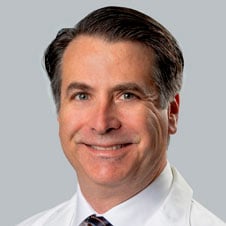As a medical student, do you ever wonder what it’s like to specialize in general surgery? Meet Philip Gachassin, MD, a general surgeon and a featured doctor in the AMA’s "Shadow Me” Specialty Series, which offers advice directly from physicians about life in their specialties. Check out his insights to help determine whether a career in general surgery might be a good fit for you.
The AMA Specialty Guide simplifies medical students’ specialty selection process, highlights major specialties, details training information, and provides access to related association information. It is produced by FREIDA™, the AMA Residency & Fellowship Database®.
Learn more with the AMA about the medical specialty of general surgery.
“Shadowing” Dr. Philip Gachassin
Specialty: General surgery.
Practice setting: Health system.
Employment type: Employed by Ochsner Health, in Lafayette, Louisiana. Ochsner Health is a member of the AMA Health System Program, which provides enterprise solutions to equip leadership, physicians and care teams with resources to help drive the future of medicine.
Years in practice: 30.
A typical day and week in my practice: I generally operate three days per week and have clinic two days per week. On operative days, we start at 7:30 a.m., arriving at the hospital around 7 to confirm the patient's presence, ensure they don't have any lingering questions and prepare for surgery. Elective surgeries typically start at 7:30 a.m., and we then proceed with the day's scheduled procedures.
Depending on the day's agenda, we may be occupied with surgery, taking calls about other patients, consulting new patients or attending to patients in the hospital or clinic. The day usually ends when all work is finished. If it's a clinic day, we begin in the hospital, checking on any inpatients, followed by attending our clinic, where we see established and new patients and cater to all sorts of issues. These clinic days usually run from 9 a.m. to 5 p.m. Both kinds of days are demanding.
The most challenging and rewarding aspects of general surgery: One of the most challenging aspects is being on emergency call for the hospital. General surgeons are often called in for any problem involving the intestinal tract, which can often be life-or-death situations. These emergencies don't adhere to business hours. This can be challenging, as it requires us to be available at off-hours and can involve patients coming to the emergency room or even patients from our clinic experiencing an acute exacerbation of their condition or a new complication.
Helping patients is the most rewarding part of my job. As a general surgeon, it's a great reward to be able to help and make a significant impact on a patient's life. Most cases end up doing well.
The impact burnout has on general surgery: Burnout has become more prevalent in general surgery over the last 20 to 30 years. Specialization has increased, presenting more information and data on treating specific illnesses, and not every general surgeon can handle every condition. This has led to subspecialization within the field, which has somewhat mitigated burnout, as some surgeons focus on emergency care and others on elective care. However, with increased specialization, we have seen access decrease. The notion behind increased specialization was to reduce burnout, but it has inadvertently decreased patient access.
How Ochsner Health is reducing physician burnout: Ochsner has an Office of Professional Well-Being that is working on the problem of physician burnout. The organization is working with the AMA on that, and Ochsner has been recognized by the AMA Joy in Medicine™ Health System Recognition Program—for the third time in five years—for its work on improving physician satisfaction and reducing burnout.
How my lifestyle matches, or differs from, what I had envisioned: General surgery is a field where work-life balance is almost nonexistent. When I chose this path 30 years ago, I was aware of this. Despite the lack of work-life balance, I find the work rewarding. Traditionally, it would attract surgeons who were committed to taking care of their patients throughout their care.
Skills every physician in training should have for general surgery but won’t be tested for on the board exam: Listening and patient-communication skills are essential. Anyone can diagnose certain conditions, especially with today's technology, and most people with average hand-eye coordination can learn to perform surgeries, including complex ones. But listening to patients, understanding their needs and delivering care in a compassionate manner are skills everyone needs.
One question physicians in training should ask themselves before pursuing general surgery: While this may sound somewhat negative, I believe every trainee should ask themselves: “Are there any other fields I'm interested in?" This is important because general surgery is a challenging lifestyle that demands a lot of time and commitment. Unless you're fully committed, I wouldn't suggest general surgery.
Books, podcasts or other resources every medical student interested in general surgery should be reading: The first book that everyone interested in general surgery should read is Cope’s Early Diagnosis of the Acute Abdomen, by Sir Vincent Zachary Cope, MD, MS. It's one of the most important books about diagnosing surgical illness.
An excellent novel I recently finished is Cutting for Stone, by Abraham Verghese, MD. It's a fascinating book about a surgeon and his journey.
The third book I recommend is Brave New World, by Aldous Huxley. It's a futuristic book that depicts issues relevant to medicine.
Additional advice I would give to students who are considering general surgery: Learn anatomy, develop your dexterity, practice empathy and listen to the patient.




